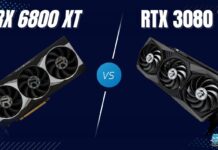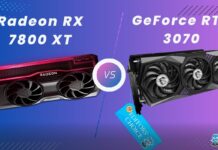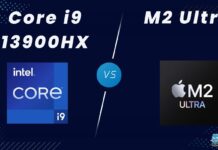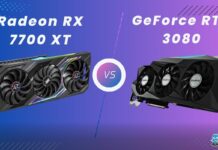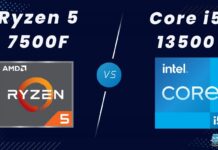Embarking on a journey through the realm of cutting-edge processors, our attention turns to the Core i7 13700HX vs Ryzen 7 7745HX, two formidable contenders vying for supremacy. As we delve into the depths of their technical specifications and meticulously scrutinize their performance benchmarks, a riveting comparison unfolds.
Key Takeaways
- To begin with, the Core i7 13700HX asserts its prowess with a 7% lead in single-core benchmarks, ensuring swift and efficient execution of individual tasks and applications.
- Boasting a significant 22% advantage in multi-core benchmarks, the Core i7 13700HX emerges as an appealing choice for handling demanding workloads and multitasking scenarios.
- In addition, the Ryzen 7 7745HX offers a flexible power range of 45-75W, allowing users to finely balance performance and power efficiency according to their specific requirements, a feature distinct from the Core i7 13700HX’s 45-55W range.
- The Core i7 13700HX supports memory capacities of up to 128GB DDR5-4800 and DDR4-3200, addressing memory-intensive applications comprehensively. In contrast, the Ryzen 7 7745HX accommodates up to 64GB DDR5-5200.
Comparison Table
| Key Specifications | Core i7 13700HX | Ryzen 7 7745HX |
|---|---|---|
| Vendor | Intel | AMD |
| Release Date | January 3, 2023 | January 4, 2023 |
| Device Type | Laptop | Laptop |
| Instruction Set | x86-64 | x86-64 |
| Integrated GPU | UHD Graphics (32EU) | Radeon 610M |
| Performance Cores | 8 | 8 |
| Performance Threads | 16 | 16 |
| Base Clock | 2.1 GHz | 3.6 GHz |
| Boost Clock | 5 GHz | 5.1 GHz |
| Total Cores | 16 | 8 |
| Total Threads | 24 | 16 |
| L1 Cache | 80K (per core) | 64K (per core) |
| L2 Cache | 2MB (per core) | 512K (per core) |
| L3 Cache | 30MB (shared) | 32MB (shared) |
| Fabrication Process | 10nm | 5nm |
| TDP (PL1) | 45-55 W (configurable) | 45-75 W (configurable) |
| Socket | BGA-1964 | FL1 |
| GPU Base Clock | 300 MHz | 1500 MHz |
| GPU Boost Clock | 1550 MHz | 2200 MHz |
| Cuda Cores | 256 | 128 |
| Execution Units | 32 | 2 |
| Memory Support | Up to 128GB – DDR5-4800, – DDR4-3200 | Up to 64GB – DDR5-5200 |
| ECC Support | Yes | No |
| Max. Memory Channels | 2 | 2 |
Core i7 13700HX Vs Ryzen 7 7745HX: Architectural Differences
The architectural disparities set the stage for a detailed exploration of their real-world capabilities. As we delve into their performance benchmarks, these differences will play a pivotal role in shaping their respective strengths and efficiencies
- Process Node: Firstly, the Core i7 13700HX harnesses the efficiency of a 10nm process node, while the Ryzen 7 7745HX is finely crafted on the advanced 5nm process, signaling enhanced performance potential.
- Clock Speed: With precision-engineered clock speeds, the Core i7 13700HX maintains a Base Clock of 2.1 GHz and an impressive Boost Clock of 5 GHz, while the Ryzen 7 7745HX commands a higher Base Clock of 3.6 GHz coupled with a Boost Clock of 5.1 GHz, offering an alternative dynamic.
- Memory Support Variation: Delving into memory capacity, the Core i7 13700HX opens the door to expansive possibilities with support for up to 128GB DDR5-4800 and DDR4-3200, while the Ryzen 7 7745HX offers up to 64GB DDR5-5200, catering to varying memory demands.
- TDP: In terms of TDP, the Core i7 13700HX adopts a configurable range of 45-55W, presenting a balanced approach to energy efficiency. In contrast, the Ryzen 7 7745HX embraces a wider configurable TDP range of 45-75W, offering greater flexibility.
- Supported Technologies: While the Core i7 13700HX bolsters reliability with ECC memory support, the Ryzen 7 7745HX takes a different path, omitting this technology but bringing its unique set of features to the forefront.
Performance Benchmarks
Now, let’s shift our focus from the technical details to the practical realm of performance benchmarks. Through a series of comprehensive tests, we’ll unveil how the Core i7 13700HX and Ryzen 7 7745HX fare in real-world scenarios.
Cinebench R23 (Single-Core)
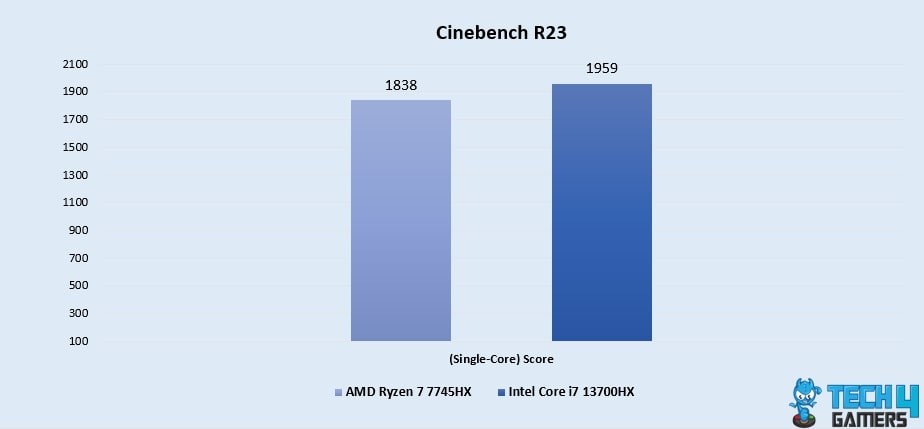
- Firstly, the Core i7 13700HX boasts a 6.3% advantage with a score of 1959, surpassing the Ryzen 7 7745HX’s 1838, indicating better single-core performance for swift task execution.
Cinebench R23 (Multi-Core)
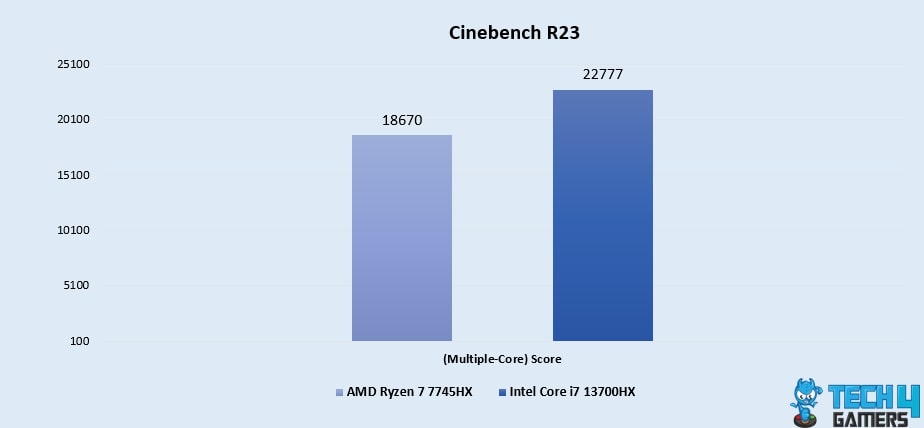
- While going over multi-core benchmarks, the Core i7 13700HX takes the lead with a notable 19.8% increase, scoring 22777 compared to Ryzen 7 7745HX’s 18670, demonstrating superior performance in multitasking and resource-intensive operations.
Geekbench 5 (Single-Core)
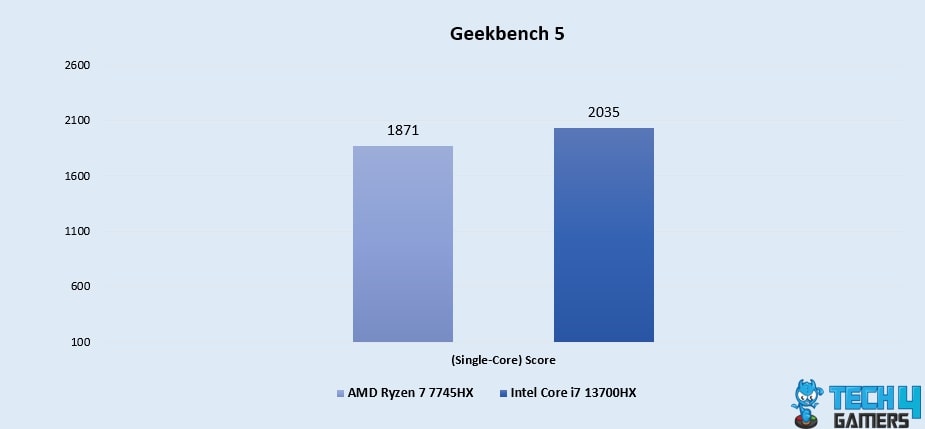
- Furthermore, the Core i7 13700HX achieves a score of 1871 in single-core Geekbench 5 tests, while the Ryzen 7 7745HX scores 2035, showing an 8.3% advantage for the latter in handling individual tasks.
Geekbench 5 (Multi-Core)
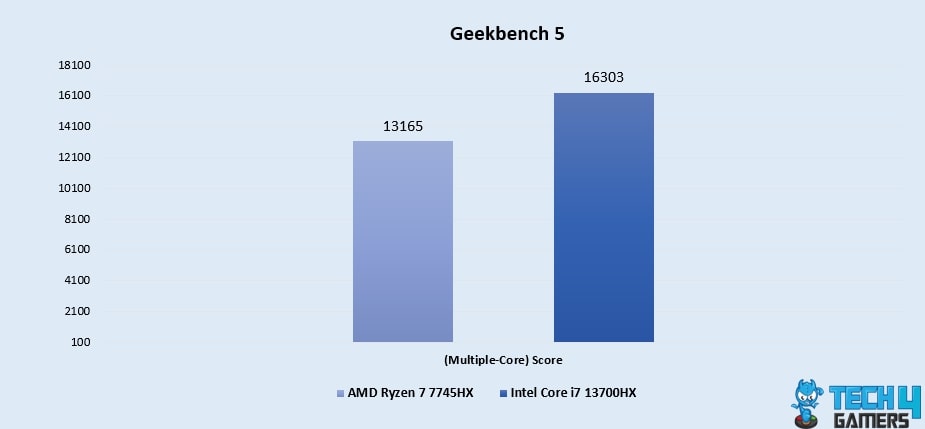
- Finally, the Core i7 13700HX demonstrates its prowess in multi-core scenarios, boasting a 21.2% lead with a score of 16303, compared to Ryzen 7 7745HX’s score of 13165, indicating robust performance during multitasking and parallel computing tasks.
Ryzen 7 7745HX Vs Core i7 13700HX: Which Chip Provides Better Value?
- Starting off, the Core i7 13700HX holds a 7.3% lead in single-core benchmarks, making it a strong contender for users who prioritize quick and efficient execution of individual tasks and applications.
- With an impressive 20.4% advantage in multi-core benchmarks, the Core i7 13700HX emerges as an ideal choice for demanding workloads and multitasking scenarios, delivering smoother performance in resource-intensive computing tasks.
- While both chips offer configurable TDPs, the Ryzen 7 7745HX features a broader range of 45-75W, compared to Core i7 13700HX’s 45-55W. This flexibility allows users to strike a balance between performance and power efficiency based on their specific needs.
- With memory capacities of up to 128GB DDR5-4800 and DDR4-3200, the Core i7 13700HX caters to memory-intensive applications, while the Ryzen 7 7745HX supports up to 64GB DDR5-5200.
Thank you! Please share your positive feedback. 🔋
How could we improve this post? Please Help us. 😔
[Comparisons Specialist]
I’m a passionate computer hardware expert specializing in CPUs and GPUs. With a lifelong curiosity for hardware and extensive hands-on experience, I provide valuable insights, practical advice, and in-depth analysis on these components. Engaging with the hardware community, I exchange knowledge and stay at the forefront of technological advancements.
Get In Touch: uzair@tech4gamers.com


 Threads
Threads
